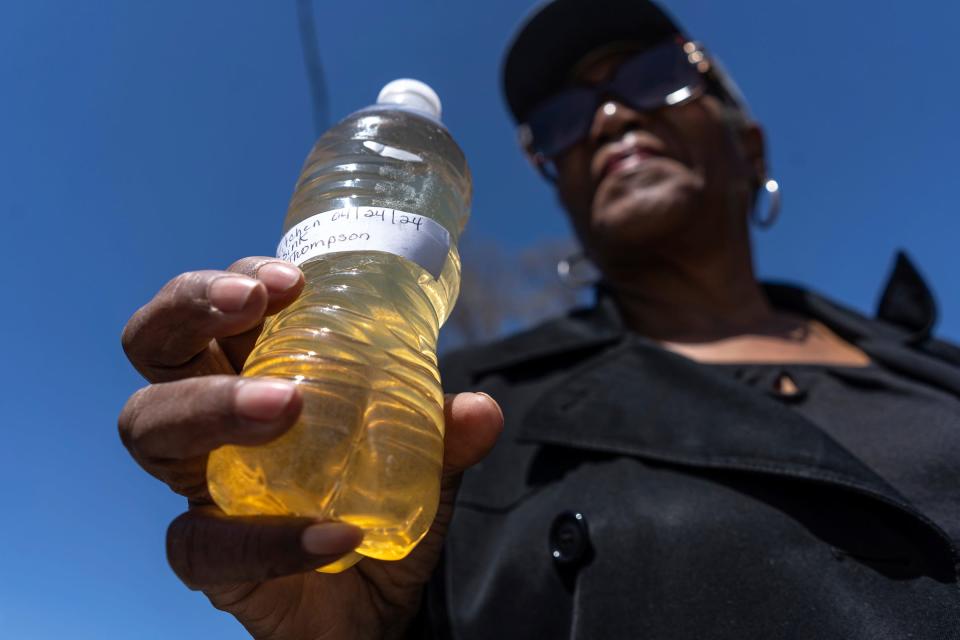Flint marks 10 years since water crisis began, but residents say: 'It's not over'
FLINT – About 75 people gathered outside the Peoples Church on Thursday in this mid-Michigan city known around the world for the public health disaster that stemmed from its lead-tainted municipal water.
They carried signs that said, "Water is a human right," and chanted, "What do we want? Clean water! When do we want it? Now!" as they marched, arms linked, from the church, down the streets, across a bridge over the Flint River, and toward City Hall.
Their voices cut through the brilliantly sunny spring day, marking 10 years since an unelected emergency manager made the catastrophic decision to change the source of the city's drinking water from Lake Huron to the Flint River as a cost-saving measure.

The switch, which took place April 25, 2014, triggered a cascade of problems with the water quality in Flint. Lead, a neurotoxin, leached from the city's aging pipes and into the water that flowed from the faucets, causing irreparable damage, especially in children, whose brains and bones were still developing.
Bacterial levels spiked, sparking boil-water advisories. A Legionnaires' disease outbreak killed at least 12 people and sickened many more, and cancer-causing chemicals called trihalomethanes, a byproduct of the chlorine used to kill bacteria, were identified in the tap water.
Knowing that he drank that water, bathed in that water and brushed his teeth with that water — for a time unaware of the toxins swirling in it — haunts 23-year-old Keishaun Wade.
"There is a lot of anxiety that has entered into my psyche now," he said. "This has been going on since I've been 13. ... It's always a question of like, 'is this how the water impacted me?' I'm worried about every little thing. I have eczema, and I think, 'am I experiencing this because of the water? Do I have diminished brain capacity?' I think about that every time I zone out. I'm like, is that because of that?"
He joined the Flint Democracy Defense League when he was 16 and got involved in activism. He marched with the crowd to City Hall on Thursday, saying he's disappointed that 10 years have passed, and there are still lead pipes in the city that have yet to be replaced.
By now, Wade said, that work should be done, along with replacement of all the water mains along with the plumbing and fixtures inside people's homes.
"Flint residents deserve that," Wade said. "We don't deserve to be left responsible to replace the internal plumbing in our homes because of a choice that was made by an (appointed emergency manager)."

A decade after that historic water source switch, an effort to replace all the lead service lines in the city still hasn't been completed. So far, 10,522 service lines in the city have been replaced, said Caitie O'Neill, a spokesperson for Mayor Sheldon Neeley.
"The remaining lines were copper and did not need to be replaced," O'Neill said.
At about 1,900 addresses in Flint, O'Neill said the city has been unable to get consent from the residents to evaluate the service lines to determine whether they need replacement because they contain lead.
"In November and December 2023, the city began excavating in the publicly owned right-of-way at those 1,900 addresses where consent could not be obtained to identify the composition of water service lines," she told the Free Press on Thursday. "Residents were sent notification letters whenever lead service lines were discovered.
"The city was also able to use internal records to identify the material of services lines at some of those 1,900 addresses. After using these two strategies to vet the list of about 1,900, there are under 1,000 locations where the city needs to go back and excavate. Some of these are known lead service lines and need to be replaced, and some are unknown and may not require removal if they are copper."
It's all too little, too late for Claudia Perkins, 71, of Flint. "This is an atrocity that should not have happened to nobody," she said.
She is furious that Flint residents have yet to see a penny of the $625 million class-action settlement that came from a lawsuit against the state, the state agency formerly known as the Michigan Department of Environmental Quality, and former Gov. Rick Snyder for making the water switch and trying to hide the health effects.

"The people don't get the money, and they don't get the justice. The criminals were let go," she said of the dismissal of criminal charges against Snyder, his top aides and leaders at the Michigan Department of Health and Human Services for their roles in the water crisis.
More: 10 years after lead poisoning, Flint residents still haven't been paid from $626.25M fund
More: In the decade following the water crisis' beginning, Flint's school district has suffered
Still, Perkins said, Flint stones, as she called herself and other residents, "are true warriors. We will not give up."
Bernice Thompson held up a water bottle Thursday afternoon outside City Hall. The bottle was filled with the amber-colored liquid that she said flowed from the faucet in her kitchen sink the day before.
"I can't bathe. I can't drink the water. I have samples here of brown water," she said, pulling clear plastic bottle after bottle filled with the discolored liquid from a bag.
Thompson, 69, lives on Stevenson Street in Flint. And 10 years after the water crisis began, she is still living the nightmare.

"It's not over," she said. "It's not over."
Contact Kristen Shamus: kshamus@freepress.com. Subscribe to the Free Press.
This article originally appeared on Detroit Free Press: Water woes continue to plague Flint a decade after start of crisis

